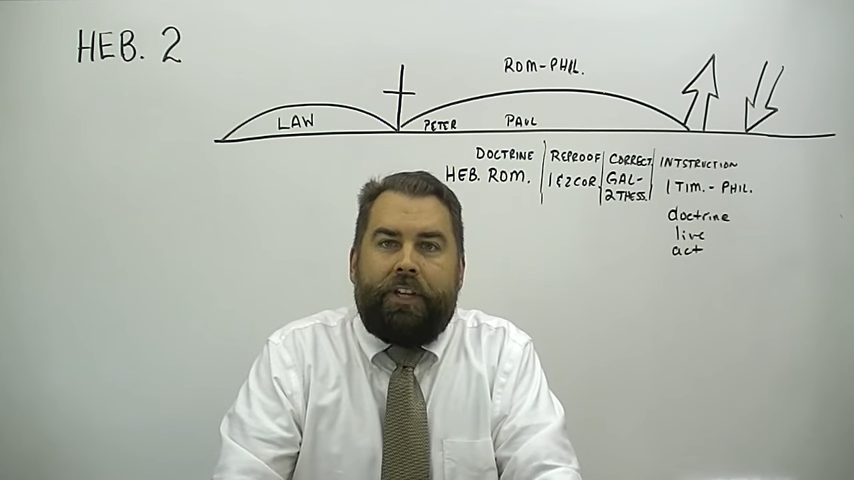Insights
The Nature and Role of Jesus
💡 The Apostle Paul states that all Scripture is given by God’s inspiration and is profitable for doctrine, reproof, correction, and instruction.
🤔 The idea that angels gave the law to Moses is a new and thought-provoking concept mentioned in Hebrews 2:6.
🤔 Jesus mentions a sin that is not forgiven in this world or the world to come, known as the sin of blaspheming the holy spirit.
📖 According to 1 Corinthians 6:2-3, the Saints are called to judge the world and even angels, highlighting the significant role of believers in the divine judgment.
👑 The passage in Psalms 8:4-9 is interpreted as referring to Jesus, highlighting his exalted status and divine nature.
📖 Jesus’s decision to become a man instead of an angel shows his deep love for humanity and prioritizes the importance of mankind in God’s eyes.
💪 Jesus will reign and put all his enemies under his feet, symbolizing his ultimate power and victory.
📖 The book of Hebrews not only reveals who Jesus is and what he did, but also explains why he came and how he accomplished his mission through suffering.
👑 Jesus, as the creator of all things, willingly suffered and died to bring many sons to glory, highlighting the significance of accepting his blood atonement for salvation and entering into glory with him.
📜 First Peter 3:18 condenses the gospel into one verse, emphasizing Christ’s suffering, shedding of blood, death, and resurrection.
Eschatology and End Times
🌍 The “world to come” refers to the millennial kingdom of Jesus Christ, a time when the curse is lifted and Jesus rules and reigns for a thousand years.
⚔️ According to Psalms 110, Jesus will rule with a rod of iron and make his enemies his footstool, which is believed to happen during the Battle of Armageddon mentioned in the book of Revelation.
Summary
TLDR: The key idea of the video is that the book of Hebrews emphasizes the significance of Jesus Christ’s suffering and death as the central theme, highlighting the importance of salvation through grace and faith in him.
- 📜 The video discusses the authorship of Hebrews and suggests that Paul may have written it based on his other letters serving as doctrine, reproof, correction, and instruction.
1.1 The video continues the verse-by-verse Bible study in Hebrews, starting from chapter 2, and the speaker mentions receiving an email with a valuable insight that they plan to incorporate into the study.
1.2 The Apostle Paul wrote the book of Hebrews and in 2nd Timothy 3:16, he states that all Scripture is given by God’s inspiration and is profitable for doctrine, reproof, correction, and instruction.
1.3 Peter was the first to preach in the church, but Paul states that all Scripture is given for doctrine, reproof, correction, and instruction, suggesting that if Hebrews was written first, it would align with Paul’s doctrine in Romans.
1.4 Paul’s letters, such as Corinthians, Galatians, and Timothy, serve as doctrine, reproof, correction, and instruction, which supports the idea that Paul was likely the writer of Hebrews.
- 📜 The speaker discusses the significance of angels and how they gave the law to Moses, while mentioning the future millennial kingdom of Jesus Christ where the curse is lifted and Jesus rules for a thousand years.
2.1 In Hebrews 2:6-12, the speaker discusses the significance of angels and references Acts chapter 7, verses 52 and 53, where there are still some things in the Bible that are not fully understood.
2.2 Stephen mentions in Acts chapter 7 that the Jews received the law from angels but did not keep it.
2.3 Angels gave the law to Moses according to the book of Acts, which suggests that angels came down from heaven and instructed Moses to write the law.
2.4 The speaker discusses how the world to come, referred to as the millennial kingdom of Jesus Christ, is a time when the curse is lifted from the earth and Jesus rules and reigns for a thousand years.
- 📖 Jesus mentions the unforgivable sin of blaspheming the Holy Spirit, the church will judge in the Millennial Kingdom, and Jesus and the church will rule over the Jews who survive the tribulation.
3.1 Jesus mentions a sin that cannot be forgiven in this world or the next, specifically the sin of blaspheming the Holy Spirit, which can only be committed while Jesus was on earth, and he refers to the world to come as the Millennial Kingdom.
3.2 Paul is discussing the Millennial Kingdom and how Jesus will reign in it, but he mistakenly believed it would happen in his lifetime.
3.3 In Hebrews, it is stated that the church, as part of the body of Christ, will have the authority to judge both people and angels in the Millennial Kingdom.
3.4 After the rapture, the church will return with Jesus in glorified bodies to rule and reign in the Millennial Kingdom, while the Jews who survive the tribulation will remain in natural bodies.
3.5 During the tribulation, the Jews who miss the rapture will endure until the end and enter the millennium, where they will live for hundreds of years, and in the Millennial Kingdom, Jesus and the church will rule over them.
- 📜 Paul cites Old Testament verses to show that they apply to Jesus Christ, emphasizing the significance of man and God’s attention towards him, and Jesus, being both God and the son of man, took on a human body to die for humanity.
4.1 The speaker discusses how Paul cites Old Testament verses to show that they apply to Jesus Christ in his opening arguments.
4.2 The passage from Psalms 8:4 is referring to Jesus, who is called the Lord Jesus Christ, and is mentioned in Hebrews 2:6-7.
4.3 Man was created a little lower than the Angels and given dominion over the works of God’s hands, as stated in Psalms 8:4-6 and Psalms 144:3.
4.4 The Holy Spirit speaks through Job, David, and Paul in Hebrews 2, emphasizing the significance of man and God’s attention towards him.
4.5 Man is a creation of God, consisting of a body, soul, and spirit, and Jesus Christ came down in the form of a man to visit and be mindful of him.
4.6 Jesus Christ, who is both God and the son of man, took on a human body to die for humanity, as mentioned in an interesting prophecy.
- 👑 Jesus came to Earth as a man because he loves humanity, and although he is currently in heaven, he will defeat the devil and reign as king, fulfilling prophecies.
5.1 Jesus came down to Earth as a man because he loves humanity, not angels, and the Bible states that he became lower than the angels.
5.2 All things are supposed to be under Jesus’ control, but currently, not everything is.
5.3 Jesus is currently in heaven, crowned with glory, and although he is the king of all, he allows the world to continue as it is until the tribulation is over, at which point he will defeat the devil and rule and reign.
5.4 The speaker discusses how Psalm 110 is quoted in Hebrews 2:6-12, explaining that it refers to Jesus ruling with a rod of iron and putting the devil under his feet.
5.5 Jesus will deliver up the kingdom to God, according to First Corinthians 15:24.
5.6 Jesus will reign and put all his enemies under his feet, including death, at Armageddon, and although it hasn’t happened yet, it is a prophecy that will definitely occur.
- 📜 Jesus Christ, the fulfillment of prophecies, came to earth as a man to suffer and die for all, shedding his blood on the cross, and the speaker emphasizes the use of the King James Bible.
6.1 Jesus Christ will rule and reign for a thousand years before all things are put back into the hands of God the Father, and although the Trinity may be difficult to understand, God is all-powerful, everywhere, and all-knowing.
6.2 The speaker introduces Jesus for the first time in the book of Hebrews, explaining that all the prophecies in the synagogue point to him as the one who came in the Jews’ lifetime.
6.3 Jesus came to earth as a man, lower than the angels, to suffer and die for every person, contradicting the belief of limited atonement.
6.4 Jesus Christ shed his blood on the cross for everyone, not just certain individuals, and he came to suffer in order to do so.
6.5 The speaker explains why they only use the King James Bible and highlights that the very first word spoken by Jesus in the King James Bible is found in Matthew chapter 3, verse 15.
- 📖 Jesus was born to suffer and his suffering is the central theme of the book of Hebrews, emphasizing the importance of coming to Christ for salvation and reaching glory.
7.1 The King James Bible is the only version that includes the word “suffer” as the first word spoken by Jesus, and the book of Hebrews emphasizes that Jesus was born to suffer, but newer versions of the Bible remove this word.
7.2 The suffering and blood atonement of Jesus Christ is the central theme of the book of Hebrews, as Jesus came to suffer and taste death for every man, so that he could be crowned with glory and honor by the grace of God, and through his sufferings, he brings many sons unto glory and perfects the captain of their salvation.
7.3 Jesus Christ is referred to as the captain of our salvation, and Paul emphasizes in the first two chapters of Hebrews that through Jesus’ sufferings, we can attain salvation and reach glory.
7.4 The book of Hebrews emphasizes the suffering of Jesus and the importance of coming to Christ for salvation, with numerous passages discussing his sufferings.
- 📜 Jesus suffered and died on the cross as the blood atonement for our sins, and the book of Hebrews emphasizes the importance of his suffering and the doctrine of salvation through grace and faith in him.
8.1 Jesus Christ suffered and died on the cross as the blood atonement for our sins, and the book of Hebrews was written to show Jews that Jesus was their Messiah.
8.2 Peter echoes Paul’s message in the book of Hebrews, emphasizing that Jesus suffered for us, setting an example for us to follow, and that his death, burial, and resurrection are the essence of the gospel.
8.3 Salvation is achieved through trusting in the suffering substitute, Jesus Christ, but throughout history, there have been challenges to this doctrine, such as the German rationalists questioning the Bible and the rise of Universalists and Unitarians who advocated for a different doctrine of salvation.
8.4 The speaker discusses the rejection of the doctrine of salvation through blood sacrifice and emphasizes that salvation is not achieved through works, but rather through grace and faith in the suffering of Jesus, making believers part of the body of Christ.
8.5 The speaker discusses the translation of Hebrews 2:6-12 and compares different English versions of the Bible, noting that the oldest English witness of the Bible translates the word as “church.”
8.6 Jesus is the founder of the church, which started with Jews, and the book of Hebrews emphasizes the importance of the blood and sufferings of Jesus for salvation.


